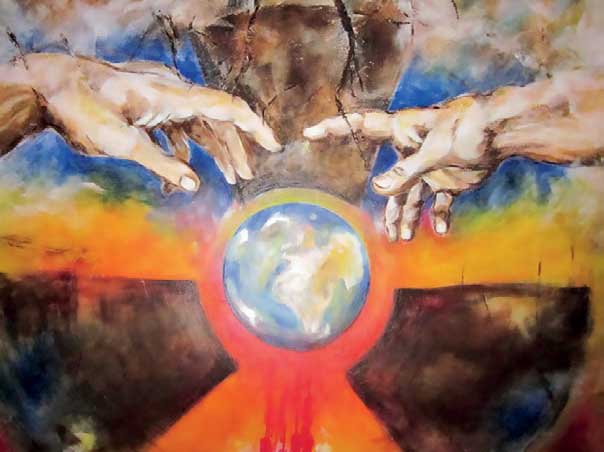The dawn of integration on a new level
Author: Prof. Dr. Fyodor N. Kozyrev
Philosopher of religion Kozyrev points out the similarities between Christian faith and modern science. Both demarcate themselves from pagan and Gnostic ideas about material reality as animate or divine. Natural science, which today rejects religion as false, would not have come into being without the Christian theorems. Constitutive for both are a dualism between ego and world as well as between spirit and matter. But also the ideas of the uniqueness of creation and the incarnation of God. In view of the crisis of the sciences and their deficits in questions of human spiritual needs, a new level of integration is necessary. The New Paradigm is oriented toward a more holistic view of nature as something alive.
When the great W. Dilthey established his useful distinction between the natural sciences and the humanities, he was motivated by a desire to defend the latter. These were often attacked by their “elder sisters,” that is, the natural sciences. He claimed that the humanities were not an undeveloped sector of the sciences, but a different kind of science. One equipped with its own methods and epistemological presuppositions. The main criterion to distinguish between the two was precisely the question of universality.
The ideal of comprehensive verified and formalized knowledge about the world was not the invention of the Enlightenment.
THE CRISIS OF NATURALS SCIENCES AND PHILOSOPHY
Natural sciences address the universal experience of mankind, grounded in the common nature of human beings, and thereby obtain their universality. In contrast, theology, the humanities, art, and other activities dealing with spiritual subjects cannot be universal in the same sense, since they are limited within hermeneutic circles of meaning. Experiences they study can be equally objectified. One can only interpret them correctly within the frame of reference or context of other phenomena of the same culture.
Truths of the humanities exist within a “language game”, if we believe Wittgenstein’s concept. We can also compare this position with the so-called intensive infinity. This is an opposite to the extensive infinity of, for example, the sequence of natural numbers. Intensive infinity, like a number of points within a circle, can be limited in space, so it can have limitations in the field of application. The hermeneutic principle of jointly enrichment of the whole and the part nevertheless opens in this kind of science the dimension of depth. And also the perspective of infinite growth of knowledge and understanding within and of a given culture. In fact, the capacity to understand the culture of the other is not, in this case, a result of expansion into far-flung regions of the spiritual universe. It arises through deepening into one’s own culture.
 The dawn of integration on a new level
The dawn of integration on a new level
In the history of Russian philosophy one can find many interesting and inspiring thoughts about universal spirituality. Names like Nikolaus Roehrich or Leo Tolstoy are enough to remind us of one of the strongest movements of religious syncretism. Among Russian intellectuals of the early 20th century they were pioneers. And they also inspired the phenomenon of Russian cosmism. Vladimir Solovyov proposed a more cautious approach to this problem. He was aso the founder of Russian religious philosophy and sophiology.
He pointed out the two fundamentally different strategies of approaching the goal of spiritual unity. One strategy is the way of minimizing differences. But this strategy also means the reduction of certain content of teachings. At least in the part where teachings of different faiths contradict each other. Many religious people, including him and me, will agree that the goal, in this case the loss of specific content, is not worth it.
The opposite strategy comes from positively evaluating differences and recognizing the diversity of spiritual worlds. These deserve attentive and comprehensive consideration. The existence of universal spirituality is not an axiom in this case. Onthe other hand it could very well be a surprising outcome of a spiritual journey.
Since I am an adherent of the second strategy, I would like to divert from the universality of human spiritual experience to a more narrowly defined historical phenomenon. Also to address some of my reflections on the relations between Christian religion and modern science.
THE PERPLEXITY OF THE WORLD DOES NOT MEAN REVELATION IS EXHAUSTED
Relations between church and science are of the utmost importance for an understanding of the new conditions of our civilization. The modern age is sometimes called postmodern. Or post-Christian, or post-positivist, and all these names refer to the same problem. The first thing to mention is that these problems are often described as a crisis in religion and science. In religion, this tendency has been observed for a long time. We recall that Hegel and his materialist followers predicted the extinction of religion almost 200 years ago.
Yes, institutionalized Christianity continues to lose its power. But also numerous sociological studies indicate that orphaned churches are not the result of a growing absence of religiosity, but rather of the ongoing process of privatization of religious life. I would add that, in my opinion, the main reason for distrusting the Church is its inability to provide relevant responses to the new challenges.
This temporary perplexity does not at all mean that the ethical and social potential of Christian revelation has been exhausted.
 Crisis of science
Crisis of science
The crisis of science is a recent theme. The word “post-positivism” testifies to the fact that the hope of replacing religion and philosophy with positive science is itself a thing of the past. Positivist science became the victim of a deep crisis. The word postmodernism sometimes defines as disenchantment with the power of scientific knowledge. Even official philosophers of the late Soviet Union had to admit the dawn of a “new epistemological situation.” Rehabilitation of metaphysics and irrationality. Consideration of the personal dimension in the epistemological function. Admission of the shortcoming of sciences in the face of human spiritual needs. All those were among the essential aspects of this new situation.
THE HEIGHTS OF SCIENCE AND THEIR CRISIS
The challenges of this common crisis call for a consideration of the relations between the two most dominant forces of the modern era: between Christianity and positive science. I approach this topic with the intention of challenging the widely held notion of a centuries-long struggle between the two and emphasizing instead the complementary nature of their relationship. There have been only two significant peaks in the development of science: in ancient Greece and in post-Reformation Europe. It would be superficial to think that the spiritual, political and cultural background played no role in these two events.
Today we see a rapid and dramatic change in the very foundations of scientific activities that threatens their future. It is not only about growing commercialization of sciences, their short-term planning and dependence on immediate technical effect. It is also about the disturbing indifference of scientific schools to epistemologically significant basic assumptions. Sciences are no longer as unified as they were two or three centuries ago. They are more scattered and esoteric. More advanced and active science teams show no interest in reconciling their findings with those of other groups. Debates about basic theoretical presuppositions and conclusions occur only occasionally today. Even though they were common for the scholastic period. And even inter-laboratory verification of empirical data is becoming an extremely rare practice.
THE MIDDLEAGE OF SCIENCE
From a social perspective, our sciences are returning to medieval times. This calls for rethinking the traditionally negative assessment of the role of the Church during the significant scientific revolution of the 16th-17th centuries. It may be that the sciences need a meta-scientific reference point in order to be universal. And if so, the characteristics of this fulcrum will be found in the sciences. For example, many valuable observations have been made of the internal coupling between religious theism and the mechanistic paradigm of European sciences. It might be helpful to reflect on the possible or desirable future reference point that could stimulate a broader shift toward the holistic trend in the sciences.
 Universal Spirituality
Universal Spirituality
As a scholar and educator of religion, I often refer to a schema that historicizes shifts in paradigms. I do that to emphasize that to apply a humanitarian religious education is to reject not only the scholastic tradition of catechism, but also the tradition of scientific objectivism. This is since in both religion is presented in terms of objective truths. While the Enlightenment highly values personality, it has simultaneously made human subjectivity the outlaw of knowledge.
Further, liberal education of the 17th-19th centuries, while attempting to overcome metaphysics, dogmatism, and indoctrination, unconsciously continued to adhere to features of scholasticism such as ‘catechetical instruction,’. Practiced this means that students are provided with closed and ready knowledge, free from doubt and further questioning. Or even the idea of giving students comprehensive (encyclopedic) knowledge. A Russian theorist from pre-revolutionary times, V. Rozanov, even blamed the official catechetical introductions for the “atrophy of religious feelings” observed in school children. He found the reason for this in the special tendency of religious teachers (at that time mainly priests) “to perceive their subject as a science” and to teach it in a scientific manner.
From a social perspective, our sciences are returning to medieval times.
Applied to our topic, this means that in contrasting religion and science in the European context, we should not overlook the consequences linking even the most extreme anti-clerical scientific movements to the clerical scholastic project. The ideal of comprehensive verified and formalized knowledge about the world was not the invention of the Enlightenment. It was inherited from the universities of the late Middle Ages. There science was the handmaiden of theology.
THE CRISIS DOGMAS AND PHENOMENAS
And here we come to the point of the notorious dogmatism and authoritarianism of Christian religion. Again, for a long time it was normal to oppose science and religion on this point. But because of the presuppositions of post-positivist epistemology, this opposition is no longer tenable.
I will not raise the arguments of M. Polanyi or T. Kuhn about the pervasive dogmatism of science. All these are only too well known. I will recall that in the mid-18th century David Hume was already mocking scientists for their belief in regularity. If the sun rises every day, it does not mean that it will rise tomorrow. If you think that and base science on that opinion, then you are a dogmatist who uncritically accepts the fact of the repetition of a natural phenomenon and turns it into a dogma of regularity. The flip side of this error is the arrogance of natural scientists towards theologians. And even more towards all who investigate spiritual objects. From the positivist point of view, the former study objective facts and arrive at reliable truths, while the latter study the game of illusions and sink into the mire of subjective opinion.
This article appeared originally on the German Homepage of Tattva Viveka: Universelle Spiritualität und die Krise der Wissenschaft




